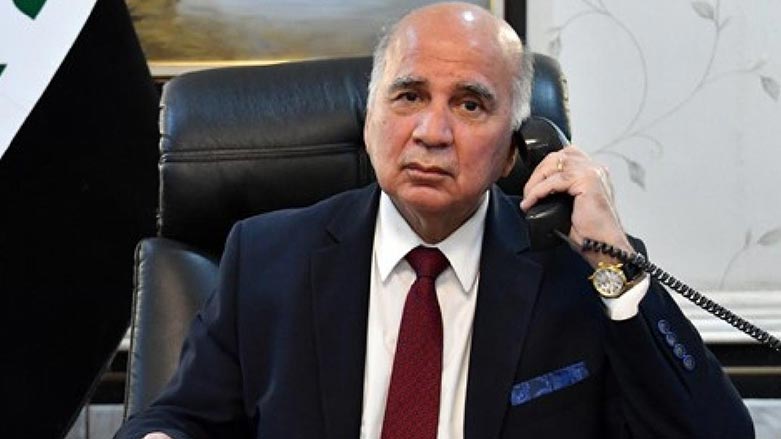Iraqi delegation to visit Washington, US confirms
“Iraq is a partner of ours,” and t the US “is a stalwart partner to the people of Iraq” and “the government of Iraq, as well," Price said.

WASHINGTON DC, United States (Kurdistan 24) – State Department Spokesperson Ned Price confirmed on Wednesday that an Iraqi delegation will visit Washington in the near future.
The delegation will be headed by Foreign Minister Fuad Hussein, who last visited Washington in the summer of 2021, under Iraq’s former prime minister, Mustafa al-Kadhimi.
Read More: US affirms broad support for Iraq in Strategic Dialogue, including continued fight against ISIS
This visit will be Hussein’s first trip to the US under the new prime minister, Mohammed Shia al-Sudani.
The two main issues the delegation will raise in Washington are Iraq’s ongoing currency crisis and the “Strategic Framework Agreement” (SFA), which was concluded between Washington and Baghdad in late 2008, in the last days of the George W. Bush administration.
In its first year in office, 2021, the Biden administration affirmed its commitment to the SFA. More than most US presidents, Biden came into office well-versed in national security matters. He had been a senator for over 30 years and rose to chair the Senate Foreign Relations Committee.
Biden held that position in 2003, when Bush launched the second Iraq War, Operation Iraqi Freedom (OIF). Indeed, shortly before OIF began, Biden was dispatched to Erbil to brief the Kurdish leadership on the coming war.
Unlike Bush’s two immediate successors, Barack Obama and Donald Trump, Biden supported the war. Even as Biden withdrew US forces from Afghanistan, ending what had become America’s longest war, his administration was careful to affirm its continued commitment to Iraq, including the Strategic Framework Agreement.
This was not a broad withdrawal from the Middle East—but just from Afghanistan—was the message from the Biden administration.
Read More: White House affirms Biden’s ‘strong commitment to Iraq’
Asked on Wednesday about the upcoming visit of the Iraqi delegation, Price confirmed that the visit would occur, but declined to provide much detail about the agenda.
“We tend not to preview visits that far in advance,” Price responded (the reporter had suggested it would be “in the next two weeks.”)
The reporter also asked a question related to the sharp decline in the value of the Iraqi dinar, which has sparked protests in Baghdad and elsewhere.
Read More: Iraqis protest at central bank over falling currency
One possible explanation for the fall in the dinar’s value concerns intensified US efforts to enforce sanctions against Iran, as the US and Europe abandon their earlier hopes of reviving the 2015 Iranian nuclear accord.
Read More: US announces new sanctions on Iran, in concert with European allies
Possibly, US suspicions that Iran was using Iraqi outlets to evade sanctions led to more intense US monetary oversight, resulting in fewer US dollars being released into the Iraqi banking system. This caused the price of the dollar to rise and the value of the dinar to fall.
Asked about US concerns that Iran was exploiting Iraq’s financial system and if such concerns had created problems for Iraqi banks, Price responded that while the US was enforcing sanctions on Iran—and would continue to do so—it was open to suggestions as to how to refine those measures.
“Sanctions enforcement is an iterative process,” Price said, and “we routinely have engagements with partner governments and with the private sector to make them aware of the scope of our sanctions.”
“Iraq is a partner of ours,” he continued, affirming that the US “is a stalwart partner to the people of Iraq” and “to the government of Iraq, as well.”
“I expect when we do have an opportunity for a bilateral engagement, we’ll discuss not only those bilateral issues, but also the broader regional issues, including the challenges we see posed by Iran,” Price concluded.